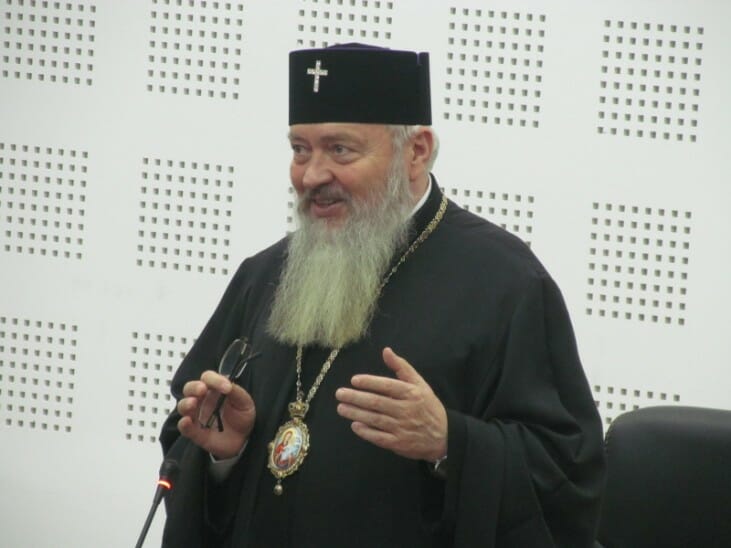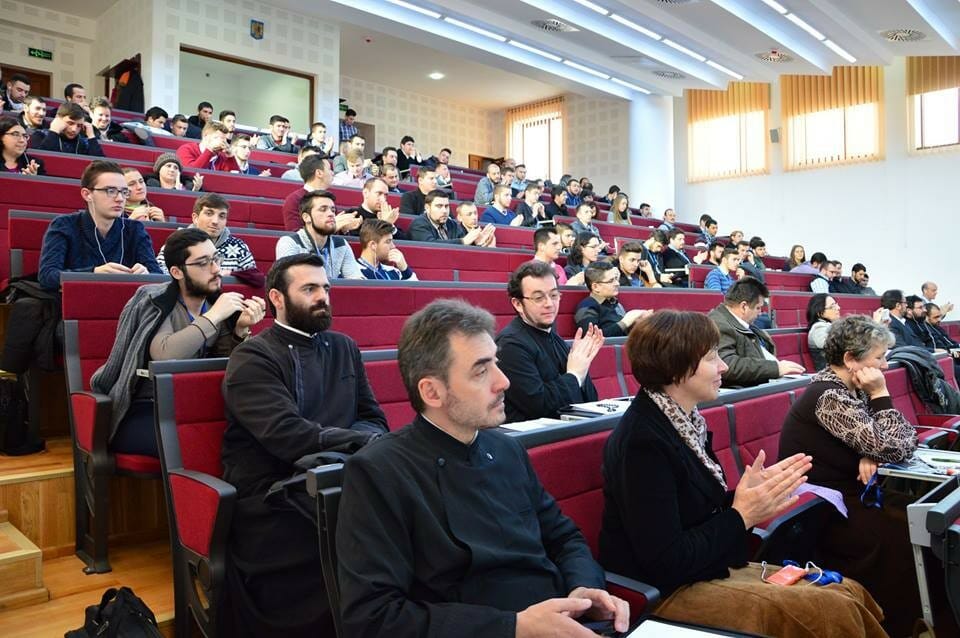 Already in 2004, getting to know each other, establishing dialogue and intensifying the spirit of communion were the objectives that had pushed the Orthodox Faculty of Theology of University Babeş – Bolyai of Cluj-Napoca and the members of the Focolare Movement to start a fruitful spiritual exchange of ideas and experiences. With time, this relationship was enriched by an ecumenical course that led to a dialogue at a theological level especially in recent years. In the common desire to bring Chiara Lubich’s charism of unity to Orthodox theology, this year both parties agreed to foster joint activities between the Romanian Faculty and the Sophia University Institute (SUI) in Loppiano (Florence), in a Symposium between the two academic institutions in Cluj-Napoca from 26 to 28 November. The symposium was opened by the Metropolitan of Cluj-Napoca, Andrei Andreicut who conveyed encouraging words for the precious effort to reach this deep communion. Also present was Bishop Vasile Somesanul, who has been a protagonist for many years in this undertaking. The lessons were entrusted to SUI professors on the part of the Movement, among whom was the Institute’s Rector, Piero Coda. On the Orthodox side, was the Dean of the Faculty, Fr Vasile Stanciu, with three qualified professors of three of the theological faculties in Romania, Cluj, Sibiu and Alba Iulia. Some lessons like those on ecumenism and the sacred scriptures were jointly expounded.
Already in 2004, getting to know each other, establishing dialogue and intensifying the spirit of communion were the objectives that had pushed the Orthodox Faculty of Theology of University Babeş – Bolyai of Cluj-Napoca and the members of the Focolare Movement to start a fruitful spiritual exchange of ideas and experiences. With time, this relationship was enriched by an ecumenical course that led to a dialogue at a theological level especially in recent years. In the common desire to bring Chiara Lubich’s charism of unity to Orthodox theology, this year both parties agreed to foster joint activities between the Romanian Faculty and the Sophia University Institute (SUI) in Loppiano (Florence), in a Symposium between the two academic institutions in Cluj-Napoca from 26 to 28 November. The symposium was opened by the Metropolitan of Cluj-Napoca, Andrei Andreicut who conveyed encouraging words for the precious effort to reach this deep communion. Also present was Bishop Vasile Somesanul, who has been a protagonist for many years in this undertaking. The lessons were entrusted to SUI professors on the part of the Movement, among whom was the Institute’s Rector, Piero Coda. On the Orthodox side, was the Dean of the Faculty, Fr Vasile Stanciu, with three qualified professors of three of the theological faculties in Romania, Cluj, Sibiu and Alba Iulia. Some lessons like those on ecumenism and the sacred scriptures were jointly expounded.  The various papers focused on the theme of the Holy Spirit, as expressed in the Symposium’s title: St Basil the Great’s theological writings on the Holy Spirit. The work of the Holy Spirit in the Church and in creation. All felt that “the presence of the Holy Spirit was tangible, and evidenced not only in the luminosity of the papers presented, but also in the communion with God that everyone experienced”. One of the participants said, “We all felt that an encounter was possible since there was the real intent to give of oneself,” while another participant underlined “the great harmony that reigned, and the joy of being able to share the wealth of our single churches”. In the days before the Symposium lessons were given by Piero Coda at the Orthodox Faculty of Theology especially students of the Faculty itself, and also those of the Roman-Catholic, Greek-Catholic and Evangelical faculties of the University. During the week in the town of Sibiu an event focused on the debate on the future of Europe, organised by the Ecumenical Centre of Sibiu, at which among the main speakers were Professor Piero Coda and the writer, Andrei Pleşu, an outstanding Romanian academic. The Symposium was also the occasion to plan future projects and in this regard intense collaboration was foreseen. The next academic year will see an exchange of professors between the Orthodox Faculty and SUI. Prospects are for a joint seminar in Sophia in the first half of 2017.
The various papers focused on the theme of the Holy Spirit, as expressed in the Symposium’s title: St Basil the Great’s theological writings on the Holy Spirit. The work of the Holy Spirit in the Church and in creation. All felt that “the presence of the Holy Spirit was tangible, and evidenced not only in the luminosity of the papers presented, but also in the communion with God that everyone experienced”. One of the participants said, “We all felt that an encounter was possible since there was the real intent to give of oneself,” while another participant underlined “the great harmony that reigned, and the joy of being able to share the wealth of our single churches”. In the days before the Symposium lessons were given by Piero Coda at the Orthodox Faculty of Theology especially students of the Faculty itself, and also those of the Roman-Catholic, Greek-Catholic and Evangelical faculties of the University. During the week in the town of Sibiu an event focused on the debate on the future of Europe, organised by the Ecumenical Centre of Sibiu, at which among the main speakers were Professor Piero Coda and the writer, Andrei Pleşu, an outstanding Romanian academic. The Symposium was also the occasion to plan future projects and in this regard intense collaboration was foreseen. The next academic year will see an exchange of professors between the Orthodox Faculty and SUI. Prospects are for a joint seminar in Sophia in the first half of 2017.
Begin again with trust
Begin again with trust




0 Comments